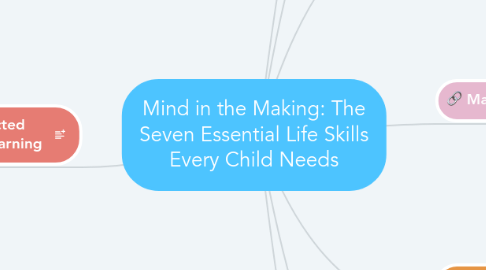
1. Focus and Self-Control
1.1. Manage impulses
1.2. Pay attention
1.3. Reduce distractions
1.4. Think flexibly
2. Perspective Taking
2.1. Imagine yourself in someone else's shoes
2.2. Figure out what others think and feel
2.3. take others' perspectives
2.4. Reduce conflict
3. Communicating
3.1. Think about your own thinking
3.2. Clarity
3.2.1. Needs and wants
3.2.2. Ideas, feelings, and questions
3.2.3. What one wants to communicate
3.2.4. How our communications will be understood by others
4. Making Connections
4.1. Heart of learning
4.1.1. Learning relates something new with something known
4.1.2. What's same?
4.1.3. What's different?
4.1.4. Connections between new and old
4.2. Creativity
4.2.1. Make something new from known things
4.2.2. Unusual connections
5. Critical Thinking
5.1. When and how to ask questions
5.2. Search for valid and reliable knowledge
5.2.1. Beliefs
5.2.2. Decisions
5.2.3. Actions
6. Taking on Challenges
6.1. Challenges
6.1.1. Take them on, not just coping
6.1.2. Think flexibly
6.1.3. Persist
6.1.4. Manage stress
6.2. Take responsible risks
6.2.1. Accept failure
6.2.2. Keep trying
7. Self-Directed Engaged Learning
7.1. Establishing trustworthy relationship with children
7.1.1. Trust is the foundation
7.1.2. Listen actively
7.1.2.1. Thoughts
7.1.2.2. Ideas
7.1.2.3. Worries
7.1.3. Respond
7.1.3.1. Verbal
7.1.3.2. Non-verbal
7.1.4. Relationship
7.1.4.1. In sync
7.1.4.2. Out of sync
7.1.4.3. Moving in and out of sync is normal
7.2. Helping children set and work toward their own goals
7.2.1. Goal setters and achievers
7.2.2. Goals
7.2.2.1. Set goals
7.2.2.2. Articulate goals
7.2.2.3. Celebrate achievements
7.2.3. Exploration
7.2.3.1. Ask questions
7.2.3.2. Seek answers
7.2.3.3. Set plan to achieve goals
7.3. Involving children socially, emotionally, and cognitively
7.3.1. Co-existence in brain and learning
7.3.2. Meaningful experiences
7.3.2.1. Direct experiences
7.3.2.2. Engaged
7.3.2.3. Interested
7.3.2.4. Autonomy
7.3.3. Learn from each other
7.4. Elaborating and extending children's learning
7.4.1. Engage in more complex learning
7.4.2. Stretch thinking and learning
7.4.3. Curiosity
7.4.4. Ask open-ended questions for deeper thinking
7.4.4.1. Why?
7.4.4.2. What?
7.4.4.3. Where?
7.4.4.4. Who?
7.4.5. Show genuine interest
7.4.5.1. Repeat what child says
7.4.5.2. Provide feedback
7.5. Helping children practice, synthesize, generalize, and share what they've learned
7.5.1. Learn by doing
7.5.2. Share and teach others
7.5.3. Learn from others
7.5.4. Build on motivation for learning
7.6. Helping children become increasingly accountable
7.6.1. Expect personal best
7.6.2. Clear expectations for success
7.6.3. Praise in ways that that children strive to do personal best
7.6.3.1. Positive things
7.6.3.2. Praise strategies
7.6.4. Students as owners of their learning
7.6.5. Students as problem solvers
7.6.6. Mistakes
7.6.6.1. Freedom to make mistakes
7.6.6.2. Self-evaluation
7.6.6.3. Learn from mistakes
7.6.7. Teach others and learn from each other
7.7. Creating a community of learners
7.7.1. Parents
7.7.1.1. First and best teachers
7.7.1.2. Adult lifelong learners make best parents and teachers
7.7.1.3. Engage children in learning
7.7.2. Intentional about lifelong learning
7.7.2.1. Regular and ongoing opportunities
7.7.2.2. Share and learn from others
7.7.2.3. Enjoy learning
7.7.2.4. Value learning
7.7.2.5. Celebrate learning
